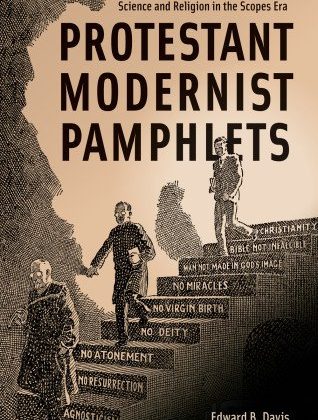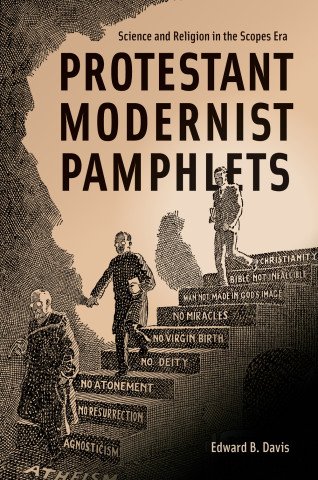

Edward B. “Ted” Davis is Professor Emeritus of the History of Science at Messiah University and a Fellow of the International Society for Science & Religion. This interview is based on his new book, Protestant Modernist Pamphlets: Science and Religion in the Scopes Era (Johns Hopkins University Press, 2024).
JF: What led you to write Protestant Modernist Pamphlets?
ED: We know a great deal about conservative Protestants and science between the world wars—the period surrounding the Scopes trial—but almost nothing about how their religious adversaries, the modernists, responded to challenges from science. When I discovered a series of tracts about “Science and Religion” by eminent scientists and religious leaders in the modernist camp, I knew I had a book in the making.
JF: In 2 sentences, what is the argument of Protestant Modernist Pamphlets?
ED: The modernists uncritically embraced the “Conflict” thesis of science and religion—an idea often associated with Andrew Dickson White and John William Draper that has been wholly rejected by historians today. They believed the orthodox creeds were incompatible with intellectual integrity and that Christian theology was entirely incapable of interacting productively with science.
JF: Why do we need to read Protestant Modernist Pamphlets?
ED: Historians of science will find much new information about the religious beliefs of many leading scientists from the first half of the twentieth century. Historians of religion will learn how modernist theologians and clergy enlisted financial and moral support from the scientific establishment to combat William Jennings Bryan’s antievolution crusade. Theologians will see how the radical theological agenda of the modernists, based partly on the “Conflict” thesis, has shaped the ongoing “dialogue” of science and religion, not always in helpful ways.
JF: Why and when did you become an American historian?
ED: My interest in the history of Christianity and science began while I was teaching science and mathematics at a Christian school in North Philadelphia. To further that interest, I did doctoral work in the history of science with Richard S. Westfall and Edward Grant at Indiana University. Although I always had one eye on the history of creationism and related topics, most of my publications before 2001 dealt with aspects of the Scientific Revolution, especially Robert Boyle. My focus since then on the history of religion and science in America resulted directly from the pamphlet project: I needed to learn more about American religion and American science from 1880 to 1930.
JF: What is your next project?
ED: I have several irons in the fire, but it’s not yet clear which one will glow first. Possibly, I will record a set of lectures on Darwin, evolution, and God for ClassicalU, who did a great job with my course on The Scientific Revolution. Or, I might continue writing a book based on those lectures. Or, I might explore the extent to which Reformed theology may have influenced Robert Boyle’s natural philosophy, whether or not he was a Calvinist (most scholars don’t think he was). Or, I might write a short history of American evangelicals and science since 1800, about which I wrote many columns for BioLogos several years ago.
JF: Thanks, Ted!